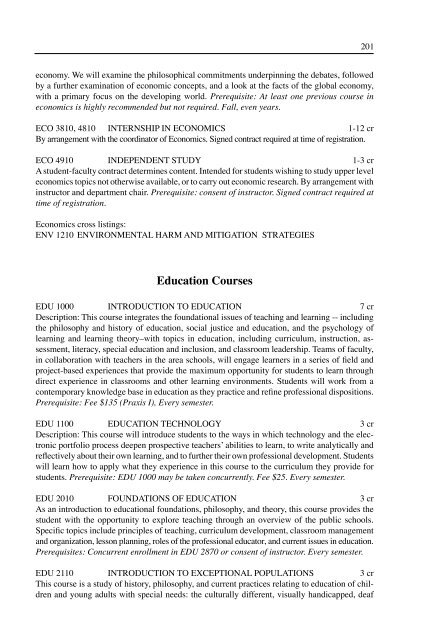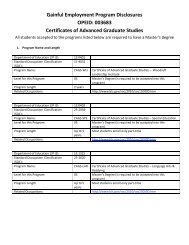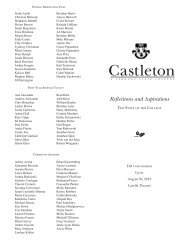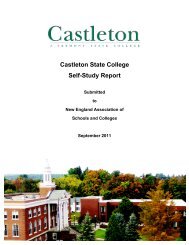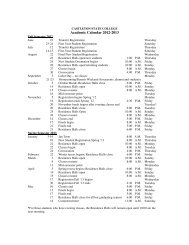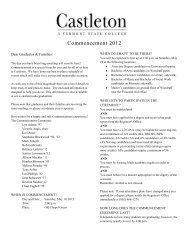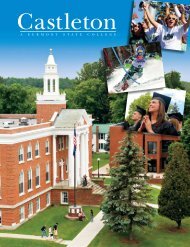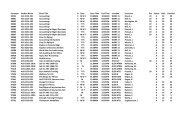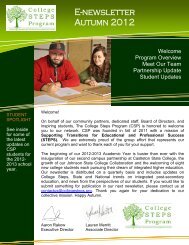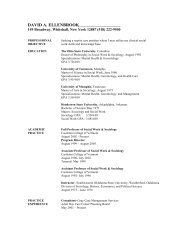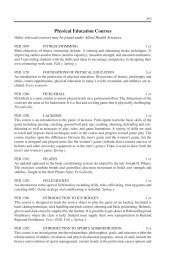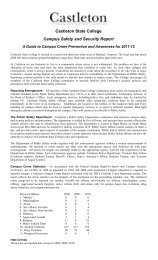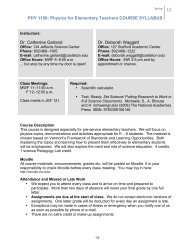Education Courses - Castleton State College
Education Courses - Castleton State College
Education Courses - Castleton State College
Create successful ePaper yourself
Turn your PDF publications into a flip-book with our unique Google optimized e-Paper software.
201<br />
economy. We will examine the philosophical commitments underpinning the debates, followed<br />
by a further examination of economic concepts, and a look at the facts of the global economy,<br />
with a primary focus on the developing world. Prerequisite: At least one previous course in<br />
economics is highly recommended but not required. Fall, even years.<br />
ECO 3810, 4810 INTERNSHIP IN ECONOMICS 1-12 cr<br />
By arrangement with the coordinator of Economics. Signed contract required at time of registration.<br />
ECO 4910 INDEPENDENT STUDY 1-3 cr<br />
A student-faculty contract determines content. Intended for students wishing to study upper level<br />
economics topics not otherwise available, or to carry out economic research. By arrangement with<br />
instructor and department chair. Prerequisite: consent of instructor. Signed contract required at<br />
time of registration.<br />
Economics cross listings:<br />
ENV 1210 ENVIRONMENTAL HARM AND MITIGATION STRATEGIES<br />
<strong>Education</strong> <strong>Courses</strong><br />
EDU 1000 Introduction to <strong>Education</strong> 7 cr<br />
Description: This course integrates the foundational issues of teaching and learning -- including<br />
the philosophy and history of education, social justice and education, and the psychology of<br />
learning and learning theory–with topics in education, including curriculum, instruction, assessment,<br />
literacy, special education and inclusion, and classroom leadership. Teams of faculty,<br />
in collaboration with teachers in the area schools, will engage learners in a series of field and<br />
project-based experiences that provide the maximum opportunity for students to learn through<br />
direct experience in classrooms and other learning environments. Students will work from a<br />
contemporary knowledge base in education as they practice and refine professional dispositions.<br />
Prerequisite: Fee $135 (Praxis I), Every semester.<br />
EDU 1100 <strong>Education</strong> Technology 3 cr<br />
Description: This course will introduce students to the ways in which technology and the electronic<br />
portfolio process deepen prospective teachers’ abilities to learn, to write analytically and<br />
reflectively about their own learning, and to further their own professional development. Students<br />
will learn how to apply what they experience in this course to the curriculum they provide for<br />
students. Prerequisite: EDU 1000 may be taken concurrently. Fee $25. Every semester.<br />
EDU 2010 FOUNDATIONS OF EDUCATION 3 cr<br />
As an introduction to educational foundations, philosophy, and theory, this course provides the<br />
student with the opportunity to explore teaching through an overview of the public schools.<br />
Specific topics include principles of teaching, curriculum development, classroom management<br />
and organization, lesson planning, roles of the professional educator, and current issues in education.<br />
Prerequisites: Concurrent enrollment in EDU 2870 or consent of instructor. Every semester.<br />
EDU 2110 INTRODUCTION TO EXCEPTIONAL POPULATIONS 3 cr<br />
This course is a study of history, philosophy, and current practices relating to education of children<br />
and young adults with special needs: the culturally different, visually handicapped, deaf
202<br />
Undergraduate Catalog<br />
and hearing impaired, learning impaired, emotionally disabled, intellectually gifted, physically<br />
handicapped, and learning disabled. The course also includes an overview of Public Law 94-142<br />
and its implication for the inclusion of youngsters into regular classroom environments. Prerequisite:<br />
Completion of, or concurrent enrollment in, EDU 2010, EDU 2870.<br />
EDU 2140 Cognitive Differences and Emotional Challenges 3 cr<br />
This course focuses on students with Low Incidence Disabilities: severe and multiple disabilities,<br />
autism, moderate-severe learning impairments, sensory disabilities, and severe emotional and behavioral<br />
disabilities. Pre-service special educators will be learning about the characteristics of these<br />
students and the strategies to teach them academic and social skills within the regular classroom, in<br />
resource rooms, and in substantially separate classrooms. Emphasis is placed on interventions and<br />
assessment for functional academics, blended with life-skills and adaptive technology. The field<br />
component of this course is 15 hours based on licensing area. Prerequisite: EDU 2110. Fall.<br />
EDU 2870 EARLY FIELD EXPERIENCE 1 cr<br />
This course is an opportunity for students to have early field experience with teachers and children<br />
in the school environment. It must be taken concurrently with EDU 2010. Involves 15 hours of<br />
class time and a minimum of 30 hours of field observation, study and participation. Physical<br />
<strong>Education</strong> majors are to take PED 2810, Practicum in Early School Involvement instead. Prerequisite:<br />
Concurrent enrollment in EDU 2010 or consent of instructor. Pass/No Pass.<br />
EDU 3040 DEVELOPING LITERACY K-6: MULTIPLE PERSPECTIVES 3 cr<br />
Students will study theorists and principles associated with the three models of reading, learn<br />
how to provide a balanced reading-writing program, collaboratively create a variety of materials<br />
and guides for classroom use, and understand Vermont’s Writing Assessment and Portfolio<br />
Guidelines. In addition, students will be responsible for developing an interdisciplinary thematic<br />
unit plan that fosters literacy development. Prerequisite: EDU 2010, EDU 2110, EDU 2870.<br />
EDU 3050 ANALYSIS OF READING DIFFICULTIES 3 cr<br />
In this course, students will study current theories and principles associated with literacy development,<br />
learn how to analyze reading difficulties with appropriate forms of formal and informal<br />
diagnostic measures, and develop a variety of remediation strategies and techniques. In a field<br />
component for this course, students will be required to work weekly out in a public school to<br />
complete an actual written case study. Prerequisite: EDU 2010, EDU 2870, EDU 3040, EDU<br />
3130, EDU 3170, or consent of instructor. Lab fee $20.<br />
EDU 3130 Learning Differences and Attention Difficulties 3 cr<br />
This course focuses on students with High Incidence Disabilities: learning disabilities, attention<br />
deficit hyperactive disorders, and mild/moderate emotional and behavior disorders. Pre-service<br />
special educators will learn about the characteristics of these students and the strategies used to<br />
teach them collaboratively within the regular classroom and in resource rooms for academic and<br />
social success. Emphasis will be placed on diagnosing and remediating literacy difficulties across<br />
academic areas, and utilizing assistive technology to accommodate for these challenges. The field<br />
component of this course is 15 hours based on licensing area. Prerequisite: EDU 2110 Spring.<br />
EDU 3170 READING AND WRITING IN THE CONTENT AREAS 3 cr<br />
This course focuses on how constructivist, language-based principles apply to learning in secondary<br />
school content courses. It is an inquiry course focused on two principal questions: (1) What is your<br />
relationship to language Who are you, a prospective teacher, as a reader and a writer (2) What is<br />
the nature of language and what is its place in the teaching/learning process in a secondary school
Course Descriptions: <strong>Education</strong><br />
203<br />
classroom Ultimately, the purpose is for you to (1) identify and put into practice principles based<br />
on the theory that reading and writing generate thinking and learning in the content areas and (2)<br />
learn specific reading and writing strategies that encourage students to be active and committed<br />
learners in their subject matter fields. Prerequisite: EDU 2010, EDU 2110, EDU 2870. Fall.<br />
EDU 3270 INTERCULTURAL SENSITIVITY IN EDUCATION 3 cr<br />
This course provides a theoretical and practical framework to assist the student/prospective educator<br />
in developing the insight to interpret and analyze the cultural cues encountered daily. Specific<br />
topics include tenets of multicultural education, dynamic aspects of micro-cultures (race, ethnicity,<br />
gender, exceptionality, age religion, sexual orientation, etc.), and strategies for developing<br />
intercultural sensitivity. Prerequisite: For <strong>Education</strong> majors: EDU 2010, 2110, 2870, or consent<br />
of instructor; for Business majors: any one course from the Philosophical/ Psychological/ Social<br />
Analysis Core and BUS 2020; for other majors: consent of instructor. Fall .<br />
EDU 3280 Behavior Differences:<br />
Social and Academic Success for All<br />
3 cr<br />
The course will focus on positive strategies to reduce problem behavior, increase academic<br />
achievement and improve social behaviors across all environments. <strong>Education</strong> students will develop<br />
knowledge and skills to prevent problem behavior and to intervene appropriately in crisis<br />
situations. The goal is to establish safe, positive classroom and school climates that will enhance<br />
the acceptance of students with behavioral challenges and will increase their self-management<br />
skills, self-esteem, and academic success. EDU 2110 or consent of the instructor. fall<br />
EDU 3330 MODELS OF TEACHING IN THE ELEMENTARY SCHOOLS 4 cr<br />
This course is a study of the interdisciplinary nature of the elementary school with an emphasis on<br />
the curricular materials to be used in teaching. Emphasis is on exposure to appropriate methodology<br />
for classroom management, math, science and language arts. A minimum of 50 hours of field work is<br />
required. Prerequisite: Junior or Senior standing, EDU 2010, EDU 2110, EDU 2870, EDU 3340.<br />
EDU 3340 EXPLORING THE PROCESS OF CURRICULUM DEVELOPMENT 3 cr<br />
The primary purpose of this project-based course is for all of us to become engaged in an inquiry<br />
focused on constructing the meaning and purpose of curriculum in the context of public schools.<br />
Our intent is that prospective teachers come to think that curriculum-making is a natural part of<br />
their role as teachers. We design activities to develop confidence in their abilities to perform this<br />
complex task, to analyze and critique different visions of elementary and secondary curricula, to<br />
understand the political nature of curriculum and to make it a habit to identify and take a stand<br />
on public school curricular issues and school reform. As part of that process we ask students to<br />
investigate their own learning experiences and become mindful of how personal experiences<br />
can shape who we become as curriculum-makers. Students will discover the language used to<br />
talk about curriculum, learn to differentiate between traditional and experientialist/constructivist<br />
perspectives on curriculum and become committed to basing curriculum on current knowledge<br />
of how we learn. Prerequisite: EDU 2010, EDU 2110, EDU 2870.<br />
EDU 3370 Models of Assessment and Intervention in<br />
Special <strong>Education</strong><br />
4 cr<br />
This course focuses on the role of the special education teacher, as he/she teaches students with<br />
learning disabilities, learning impairments, and behavioral challenges in the resource room and<br />
in the regular classroom. The emphasis is on planning, instruction, and assessment, including the<br />
linkage of assessment/evaluation with curriculum/instruction and technology. Students will be<br />
exposed to the most common assessment measures used to identify and teach students with special<br />
needs and the “paper process” that is legally required for all students with identified challenges.
204<br />
Undergraduate Catalog<br />
Emphasis is placed on literacy instruction and access to the general education curriculum. The<br />
field component of the course (60 hours) is designed to give the student hands-on practice, and<br />
opportunities for observation, teaching, and assessment that bridges previous coursework and<br />
leads to student teaching. Prerequisite: EDU 2010, EDU 2110, EDU 2870, EDU 2110, EDU<br />
3130, & EDU 2140. Fall.<br />
EDU 3380 Collaboration and Special <strong>Education</strong> Law 3 cr<br />
This course is an overview of laws that govern special education. Special educators will learn<br />
collaborative strategies for their work with regular classroom teachers, specialists, parents and<br />
administrators. Individuals with Disabilities <strong>Education</strong> Improvement Act (2004), VT <strong>State</strong> Regulations,<br />
the Family <strong>Education</strong> Rights and Privacy Act (FERPA), and Section 504 of the Rehabilitation<br />
Act 1973 will be explored. Prerequisites: EDU 2110 or consent of the instructor. Spring.<br />
EDU 3410 EDUCATIONAL ASSESSMENTS 3 cr<br />
This is an introductory course in classroom assessment. Historically focused on “objective” and<br />
“standardized” measures, the role of tests is placed within the context of contemporary challenges<br />
to this model. Students will construct valid and reliable classroom assessments; they will<br />
be able to interpret and evaluate the purposes, scores and utility of standardized, norm-referenced<br />
measures; they will understand the connection of assessment to student needs and content areas.<br />
In class, self-directed learning /class discussion are emphasized. Prerequisite: EDU 2010, EDU<br />
2110, EDU 2870, EDU 3340.<br />
EDU 3420 SECONDARY EDUCATION MATH METHODS 2 cr<br />
This course reviews current and best practices at the secondary level and will focus on mathematics<br />
methods. Prerequisite: EDU 2010, EDU 2870, MAT 1531, MAT 2532, MAT 3230.<br />
EDU 3430 MATH/SCIENCE METHODS: ELEMENTARY 3 cr<br />
Techniques and materials for teaching mathematics and science to elementary children will be<br />
studied. The course will focus on specific learning strategies which help elementary youngsters<br />
apply mathematical knowledge and scientific method through class activities, textbooks, learning<br />
kits, experiments, etc. Some actual classroom involvement is required of students taking the<br />
course. Prerequisite: EDU 2010, EDU 2870 plus core math and science courses.<br />
EDU 3450 INSTRUCTIONAL APPLICATION OF COMPUTERS 3 cr<br />
Students will study and use different applications of computers that enhance a student’s ability to learn<br />
and to express ideas. Topics will include integrated software packages, subject specific applications,<br />
multi-disciplinary integration, and an introduction to multi-media. Prerequisite: EDU 2010, EDU<br />
2110, EDU 2870 and recommended experience with a word processor. Lab fee $25.<br />
EDU 3900 INDEPENDENT STUDY 1-3 cr<br />
Hours by arrangement. Prerequisite: Consent of department chair. Signed contract required at<br />
time of registration.<br />
EDU 4060 ADVANCED INVOLVEMENT 3 cr<br />
Guided by a faculty member, the student evaluates teaching strengths and needs of student teaching<br />
experiences. Based upon this assessment, the student can work in any of the following areas:<br />
tutoring, small group instruction, large group instruction, individualized instruction, specialized<br />
teaching skills or techniques, specific curricular areas, participation in other grade levels or age<br />
groups, or areas of need or interest. This study is carried out with a faculty member. Prerequisite:<br />
EDU 2010, EDU 2110, EDU 2870, EDU 3170, EDU 3340 or consent of instructor, two additional<br />
EDU courses, and at least Junior standing.
205<br />
EDU 4210 MODELS OF TEACHING IN THE SECONDARY SCHOOLS 4 cr<br />
This course is designed to examine teaching methods appropriate for secondary education. Areas<br />
covered include general curriculum structure; the specific subject area structure; organizational<br />
and questioning skills; classroom management and interaction; unit plans and the attendant need<br />
for daily lesson planning. Half of the course involves hands-on micro-teaching experience in area<br />
middle schools or high schools. Three credits are earned in satisfying the generalized competencies<br />
required of all secondary school teachers; the fourth credit is earned by studying methods,<br />
appropriate for specific subject matter. Prerequisite: Junior or Senior standing and EDU 2010,<br />
EDU 2110, EDU 3340, EDU 2870, EDU 3170 or consent of the instructor. Spring.<br />
EDU 4720 STUDENT TEACHING SEMINAR 3 cr<br />
The seminar prepares the student for the student teaching experience, supports the student during<br />
this experience and introduces and/or reviews competencies associated with the role of the<br />
professional educator. Taken concurrently with EDU 4871 and EDU 4872. Prerequisite: Required<br />
<strong>Education</strong> courses and Senior standing.<br />
EDU 4871 DIRECTED STUDENT TEACHING I 6-9 cr<br />
This course is an opportunity for the student to teach under the guidance of a qualified cooperating<br />
teacher and college supervisor. Taken concurrently with EDU 4720 and EDU 4872. Prerequisite:<br />
Required <strong>Education</strong> courses, departmental recommendation, professional and intellectual<br />
competencies as stated in exit requirements.<br />
EDU 4872 DIRECTED STUDENT TEACHING II 6-9 cr<br />
Extension of student teaching. Under the guidance of a qualified cooperating teacher, the student<br />
gradually assumes responsibilities involved in classroom teaching. School and community relations<br />
are emphasized. Must be taken concurrently with EDU 4720 and EDU 4871. Lab fee $10.<br />
EDU 4900 INDEPENDENT STUDY 1-3 cr<br />
Hours by arrangement. Prerequisite: Consent of department chair. Signed contract required at<br />
time of registration.<br />
English <strong>Courses</strong><br />
General Policy <strong>State</strong>ment: Students write critical and/or research papers in all English Department<br />
courses. NOTE: Literature courses are designated by an “(L)” after the course title.<br />
ENG 0040 ESSENTIAL WRITING 1 cr<br />
Students whose test scores indicate underdeveloped writing skills must enroll in this course.<br />
Through close study of their own writing and the writing of others, these students learn the essentials<br />
of writing, particularly grammar and usage, sentence structure, punctuation, and mechanics.<br />
Credit for this course does not count toward diploma requirements. Concurrent enrollment in<br />
ENG 1010 is required. Every semester.<br />
ENG 1010 INTRODUCTION TO ACADEMIC WRITING 2 cr<br />
Students whose test scores indicate underdeveloped writing skills must enroll in this course.<br />
These students learn about the rhetorical concepts of writer, audience, purpose, and language,<br />
and about the relationship between these concepts and academic writing. Through a variety of<br />
academic reading and writing assignments, they apply these concepts to their own writing and to<br />
the writing of others. Credit for this course does count toward diploma requirements. Concurrent


